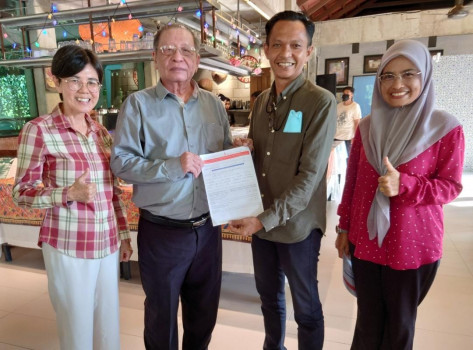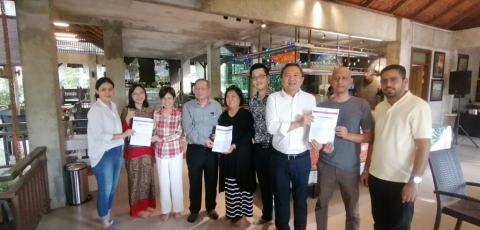
Apart from taxes on individual and corporate income from oil palm, all taxes imposed exclusively on the oil palm industry should be abolished and grants for oil palm replanting should be restored.
Oil palm is an agricultural product which is taxed the most by the government while the government provides subsidies and assistance for the production of other agricultural products.
The taxes imposed exclusively on the palm oil industry in Malaysia are as follows: –
(i) MPOB’s cess of RM14 per metric tonne ( MT) respectively on crude palm oil production (CPO) and crude palm kernel oil (CPKO);
(ii) Windfall Profit Levy on fresh fruit bunch ( FFB ) production – at 3 per cent for Peninsular Malaysia and 1.5 per cent for Sabah and Sarawak when the CPO price exceeds the level of RM2,500 per MT and RM3,000 per MT respectively;
(iii) Export Duties – progressive export duties on CPO products at a rate between 3 to 8 percent when the CPO reference price reaches the level of RM2,250 per MT, while exports of CPKO and RBDPKO (Refined Bleached Deodorized Palm Kernel Oil), were charged 10 per cent and 5 per cent of duties respectively.
(iv) Sales Tax – this tax is imposed in Sabah and Sarawak. The State Government imposes a sales tax of 7.5 per cent on CPO sales in Sabah when the CPO price exceeds RM1,000 per MT, while in Sarawak, the sales tax on CPO and CPKO is taxed at 2.5 per cent when the CPO price is in the range from RM1,000 to RM1,500 per MT. The CPO and CPKO tax rates in Sarawak increased to 5 percent when the CPO price exceeded the level of RM1,500 per MT.
In the past, the oil palm industry could withstand various taxes because of its low production cost and high selling price. When the windfall profit levy was imposed on 1/7/2008, the production cost for one MT of CPO was approximately RM400 (or RM80 for the production of one MT of FFB ) and the CPO price at that time was approximately RM3,500 per MT ( RM700 per MT of FFB ). The threshold for the windfall profit levy was set at RM2,000 per MT at that time and the rate was 15% in the Peninsular and 7.5% in Sabah and Sarawak. At that price if the FFB production was 0.8 MT per acre per month, oil palm growers can get a profit of RM480 per acre of land ! They do not feel the impact of windfall profit levy.
However, the cost of production for one MT of FFB today has jumped to RM250-RM300 per MT. This means that if the CPO price is RM1,500 per MT, the oil palm growers will not get any profit or income at all. If the price reaches RM2,500 per MT, the threshold of windfall profit levy, the farmers will only earn about RM144 per acre (based on 1 acre producing 0.8 MT of FFB per month with OER ( oil extraction rate ) of 18%. Farmers who have 5 acres of land, gets only RM720 per month. This is much lower than the minimum wage in Malaysia. How can these people be said to have made windfall profits?
From the list of taxes imposed, the people of Sabah and Sarawak are the worst victims because they are subjected to sales tax when the CPO price exceeds RM1,000 per MT, a price at which the farmers are still suffering heavy losses. I hope the state governments of Sabah and Sarawak will abolish this sales tax as they are now getting petroleum sales tax from Petronas. Sarawak recently received a sum of RM2.9 billion from Petronas for this petroleum sales tax.
The oil palm industry is no longer a golden crop industry but an industry which manages to only provide employment opportunities giving regular income to Malaysians. When the CPO price dropped to RM1800 per MT not long ago, many smallholders wanted to abandon their lands because their lands no longer are able to generate income sufficient to support their livelihoods. We must not allow this industry to be killed by the continuation of the above taxes.
The vision of the Ministry of Plantation Industries and Commodities is to make Malaysia a leader in producing agriculture commodities that are competitive and sustainable in the global market. How can we be competitive with all these taxes imposed?
These taxes have made the industry no longer competitive. This industry will die if it is no longer profitable. About 550 thousand families of oil palm growers will be the victims and the next generation of these families will be poor as has happened after the closure of the tin industry in Perak. Large companies engaged in the palm oil industry such as Felda, Felcra and Tabung Haji will also be affected.
We have allocated RM20 million to counter the Anti Palm Oil campaign. Let us start our campaign with our own government which is the largest anti-palm oil agent if these taxes are continued to be imposed on the palm oil industry.
I appeal for the above taxes to be abolished and oil palm operators be taxed on the individual and corporate taxes only from the revenue received as with individuals and corporations in other industries or businesses.
I also appeal to the government to restore replanting grant for oil palm smallholders as they face fierce challenges ahead.
Dato’ Ngeh Koo Ham
Member of Parliament Beruas


